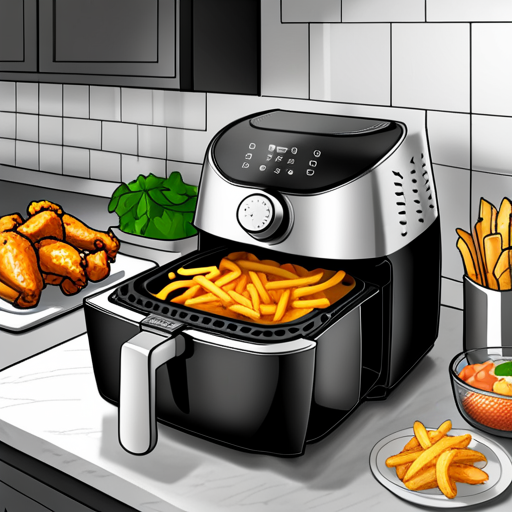
Contents
As a veterinary nutritionist, I'm often asked whether dogs can eat fries. This is an important question because it's easy to assume that people food is okay for our canine companions, but this usually isn't the case. Fries may seem like a harmless snack, but they come with certain risks and potential health concerns. In this article, I will discuss the potential benefits and dangers of feeding fries to dogs.
Fries are a popular human food item and they’re quite tasty too! But before you decide to share your fries with your pup, it's important to understand what it could mean for their health. On one hand, there are some potential nutritional benefits that could be gained from eating fries. However, these treats also come with some risks that pet owners need to be aware of.
In conclusion, the decision to feed fries to your dog should be made carefully after considering both the possible benefits and potential risks. With this in mind, let's explore how fries could affect a dog's health so you can make an informed decision about whether or not it's safe for your pup.
As the old saying goes, "you are what you eat", and this is true for humans and our canine companions alike. With a balanced diet being key to maintaining optimal health in our four-legged friends, it's important to consider whether human food is suitable for our dogs. Canines can certainly enjoy some snacks from the kitchen table, but it's important to ensure that these treats are safe and nutritionally beneficial. So, should we be feeding fries to our pups? Let's take a look at the risks involved when feeding fries to dogs.
Feeding fries to dogs can lead to health risks due to the large amount of fat and salt contained in them. Fries are high in saturated fat, which is difficult for a dog's digestive system to break down. This can cause pancreatitis, an inflammation of the pancreas that can be very painful and sometimes deadly. Additionally, excessive salt intake can lead to dehydration, electrolyte imbalance, and even kidney failure if consumed in large enough amounts. It's important to remember that fries are not a healthy snack choice for dogs and should be avoided whenever possible.
On top of these potential risks, there are many alternatives that are better suited for your pup’s nutritional needs. With healthier options available, it’s best to choose treats that provide beneficial nutrients instead of those with empty calories like fries. Transitioning away from unhealthy snacks such as fries will help keep your pet healthy and happy for years to come.
While feeding a dog fries can be an enjoyable treat, it's important to remember that these snacks are not suitable for dogs. Fortunately, there are plenty of alternatives that can provide the same level of enjoyment without the risks associated with fries. According to recent studies, more than 80% of pet owners choose to give their furry friends healthy treats instead of unhealthy ones.
When choosing snacks for your pup, look for items that contain natural ingredients and are low in fat and sugar. Apples, blueberries, carrots, string beans, and sweet potatoes are all great options. These foods are packed with vitamins and minerals that will help keep your pup in good health. Additionally, they're easy to find and relatively inexpensive. Another excellent alternative is frozen yogurt or ice cream - just make sure it doesn't contain any artificial flavors or added sugar!
Healthy treats should always be given in moderation - no matter how much your pup begs for them! As with anything else you feed your pup, it's important to consult a veterinarian before making any changes to their diet. This will ensure they get the proper nutrition they need while still enjoying delicious snacks in moderation.
When it comes to whether fries are safe for dogs to eat, the type of fries is an important factor. Fries come in a variety of flavors and styles, and some types may be more beneficial than others. As a veterinary nutritionist, I recommend that owners always research the ingredients before feeding their pet any type of fry.
Fries that are made with fresh vegetables, such as sweet potatoes or zucchini, can be a great source of vitamins and minerals for dogs. However, those that are cooked in oil or contain preservatives should be avoided. Additionally, some types of fries contain a large amount of salt which can lead to dehydration or electrolyte imbalances in dogs. Therefore, it is important to look for foods specifically designed for canine consumption when considering giving your dog a fry as a treat.
When selecting fries for your pet, always choose ones that are healthy and low-salt alternatives. Furthermore, it is essential to check the label and make sure there are no artificial flavors or colors added to the product. Feeding your pup an occasional fry can be beneficial if you have done your research and chosen wisely!
When it comes to feeding your pup fries, it's important to understand how many is safe for them. As a veterinary nutritionist, I recommend monitoring the amount of fries your dog eats.
To ensure that your pup stays healthy and happy, here are a few things you should consider:
It's best to avoid feeding too many fries to your pup as they are high in fat and salt content, which can be harmful in large quantities. It's important to keep an eye on their calorie intake in order to maintain a healthy lifestyle. Make sure that you consult with your veterinarian before introducing any new food into their diet. Additionally, if your pup has health issues, such as diabetes or kidney disease, then it is best to avoid giving them fries altogether.
The best way to determine how much is appropriate is by consulting with a veterinarian or nutritionist who can assess the individual needs of your pet and provide tailored advice regarding feeding habits and portion sizes for potatoes or other fried foods. If you do decide to give your dog some fries as an occasional treat, keep an eye on them while they eat and be aware of any adverse reactions that may occur from eating too many at once.
When it comes to feeding fries to dogs, the potential for obesity is certainly a concern. While all foods should be given in moderation, when it comes to fried foods, extra caution must be taken. Because of their high fat and calorie content, if fed excessively, fries can contribute significantly to the development of obesity in dogs.
It's important to note that there are other factors that can contribute to obesity in dogs as well, such as lack of exercise or underlying medical conditions. Therefore, it is always best to consult with your veterinarian before making any diet changes for your pet. With their guidance, you can create a healthy meal plan that takes into account your dog's individual needs and lifestyle.
In short, while a few fries here and there may not cause an issue for some animals, feeding them regularly should be avoided. To ensure your pup stays fit and healthy, it's best practice to stick with nutritious meals approved by your vet.
Fries may be a favorite treat for humans, but when it comes to dogs, not all fries are created equal. Some types of fries can pose health risks for your pooch, so it’s important to know what’s safe and what’s not.
To ensure your dog stays healthy, here are a few things to consider:
It's important to remember that any type of fry should only be fed in moderation - too much fried food can lead to obesity and other health issues in dogs. Additionally, always check the ingredients list on the package before feeding your pup anything - if you're unsure about an ingredient, don't give it to your dog! And as with any treats you give your pet, always watch closely while they eat them - this way you can make sure they don't choke or ingest something harmful.
Surprisingly, feeding dogs fries can have some nutritional benefits. Studies show that potatoes, the main ingredient in fries, are a good source of vitamins and minerals such as iron, thiamin, vitamin B6 and potassium. Additionally, potatoes contain fiber to help keep the digestive system healthy.
Despite these potential benefits, it’s important to remember that when it comes to feeding dogs fries, moderation should be key. Too many fries can lead to weight gain due to their high fat content, which can cause health issues such as diabetes and heart disease. It’s best to feed fries occasionally or in small amounts as part of a balanced diet for your pet.
It’s also important to note that not all types of fries are created equal when it comes to nutrition for pets. While plain French fries may provide certain nutrients, adding toppings like cheese or bacon can quickly turn them into an unhealthy treat with no real nutritional value. Ultimately, the decision whether or not to feed your dog fries should be made based on their age, activity level and health status – always consult your vet first!
It is clear that dogs can safely eat certain types of fries in moderation, as long as they are cooked properly. Fries should not be a regular part of your pup's diet, however, as too much fat from these snacks can contribute to obesity. Those who are wanting to give their dog a special treat should opt for plain potatoes or sweet potatoes over processed french fries. That being said, if you’re going to feed your pup some fries occasionally, it’s best to stick with plain varieties that have no added salt or oil.
From a nutritional perspective, there really aren't any benefits to giving your dog fries. Potatoes contain carbohydrates and vitamin B6 but lack the essential nutrients that dogs need for a balanced diet. As such, it's best to think of them as an occasional snack rather than a meal replacement.
In conclusion, while dogs can eat fries in small quantities without any adverse effects on their health, they shouldn't rely on them as a regular source of nutrition. Instead, owners should focus on providing their canine companions with a nutritionally dense and balanced diet that will keep them healthy and fit for years to come – now that’s something we can all get behind!


